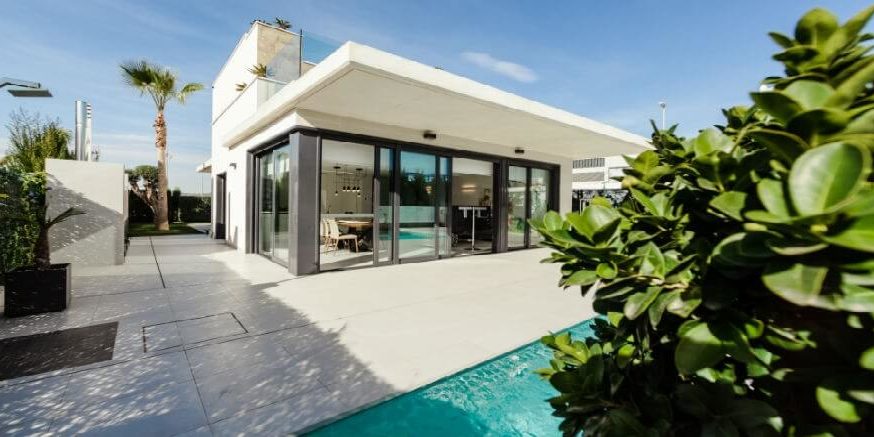Augmented reality (AR) is finding many clever uses in real estate, where this technology is merging the real world with the imagined in a way that shows prospective buyers precisely what’s possible for a property. This has transformed the industry significantly, as real estate agents are doing everything from depicting the furnishing and decorating possibilities for a vacant house to removing the distance barriers that may otherwise prevent a far-away potential buyer from making an offer on a home.
In fact, Goldman Sachs reports that real estate-related augmented reality and virtual reality technology will be an $80 billion dollar per year industry by 2025! So, let’s examine precisely how the real estate industry is using augmented reality. Real estate business owners may be surprised by the possibilities that can arise from AR technology.
Using AR for Virtual Home Staging
Virtual home staging (also called digital home staging) is rapidly gaining popularity and for good reason. After all, staging provides potential buyers with the ability to envision the property not just as a house, but as a home. This is significant because industry experts long ago realized that buyers who make an offer are those who can see themselves actually living in the home. But imagining your life in a property can be difficult if the furnishings and decor are unusual or out-of-date. The same is true of vacant properties, which tend to be slow to sell due to the potential buyer’s inability to actually picture themselves living there. This is where augmented reality technology can bridge the gap.
Augmented reality real estate apps can give realtors the ability to virtually furnish and update a home at a fraction of what it would cost to hire a staging expert and rent furnishings. Virtual home staging apps are also helpful for properties with a cluttered or outdated interior, as they allow the realtor to showcase the property without performing costly updates or convincing the homeowners to put a large portion of their belongings into storage to de-clutter.
Augmented reality apps for real estate aren’t without controversy, as some have come under fire for being a bit too creative to the point where the property is represented in an unrealistic way. For this reason, apps should be somewhat limited in their ability to render dramatic and unrealistic changes, such as preventing users from altering views from the property or expanding to include major structural changes that would be extremely costly to achieve.
Using an Augmented Reality App for Virtual Real Estate Tours
Distance is a major obstacle in the world of real estate. Virtually every real estate agent can recall a time when a far-away prospective buyer would have almost certainly turned into an actual buyer if they had an opportunity to view the home in person. Augmented reality allows real estate professionals to address this problem by creating an engaging virtual tour of a property. And while it’s called a “virtual home tour,” it’s actually created using augmented reality technology (rather than virtual reality technology) since the tour features actual footage from a real home, although it’s not uncommon to integrate a bit of digital home staging in the tour app.
Virtual home tours are becoming more and more important, as any real estate agent can attest to the fact that properties with fabulous images tend to sell the fastest. A virtual tour provides a potential buyer with the ability to move through the house as they would during an actual showing. What’s more, this offering aligns with the current trend of turning to the internet for a new home search. The National Association of Realtors reports that 95% of home buyers search online and more than half—51%—actually find their home this way.
These virtual home tour apps are ideal for long distance buyers and even for local buyers who may be too busy to schedule an in-person showing. Luxury properties tend to sell much faster when AR-based tours are made available to potential buyers. The ability to view a property via a digital platform also frees up time for the real estate agent, since those who are uninterested after completing the virtual tour can move on in their search. This means the real estate agent can focus on more serious buyers, many of whom may have already confirmed their interest in the property while performing the digital tour.
What Does This Technology Mean for the Real Estate Industry?
The ability to showcase properties in new and exciting ways has translated into some dramatic changes for the real estate industry as a whole, including:
- Real estate agents are spending less time on in-person showings with individuals who are unlikely to actually buy the property.
- Realtors have more time to focus on serious buyers since those who are in search of a different property will realize this fact earlier in the process.
- Hard-to-sell vacant or poorly decorated homes are selling much faster and for higher price tags thanks to AR technology and digital home staging.
- Properties with a digital home tour and/or digital home staging generally sell faster and for more money, particularly in the luxury home marketplace. This technology makes a luxury home more competitive in the open market.
- An increasing number of home buyers are finding the perfect property from a distance thanks to AR technology which makes it possible to tour the home from anywhere with a WIFi connection.
The net effect is greater productivity and higher profit margins for real estate professionals, while buyers are enjoying a more dynamic and immersive home buying experience. In response to these trends, many real estate agencies are seeking to develop an application that leverages augmented reality. Real estate professionals can turn to the innovative development team at 7T, as our developers have extensive experience with augmented reality applications. Our development team focuses on many emerging technologies, ranging from augmented reality, virtual reality, artificial intelligence and natural language processing to machine learning, predictive analytics and blockchain.
Based in Dallas, 7T works with clients throughout Texas—including Austin and Houston—and beyond. If you’re ready to discuss your project, contact our team today.









